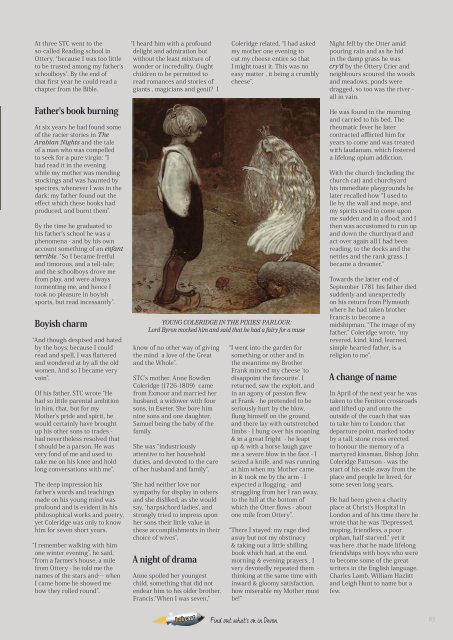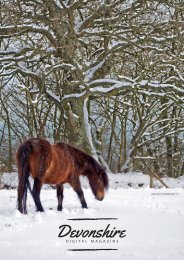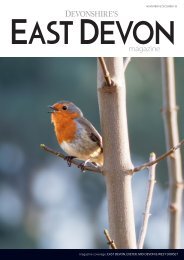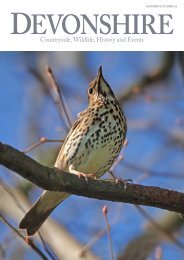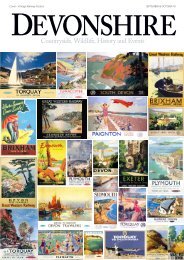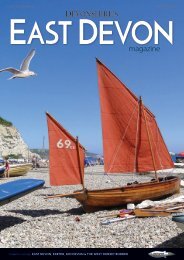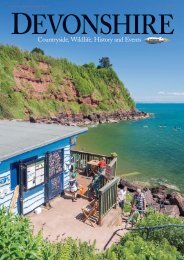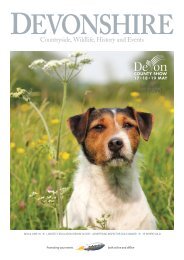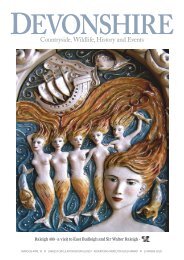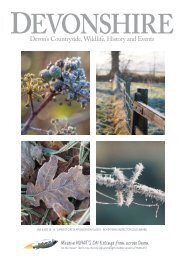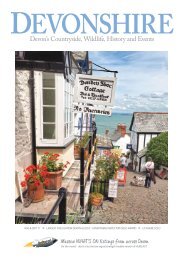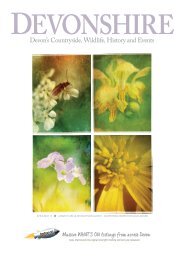Devonshire Oct to Dec 17
Devon's countryside, wildlife, history and events
Devon's countryside, wildlife, history and events
Create successful ePaper yourself
Turn your PDF publications into a flip-book with our unique Google optimized e-Paper software.
At three STC went <strong>to</strong> the<br />
so-called Reading school in<br />
Ottery, “because I was <strong>to</strong>o little<br />
<strong>to</strong> be trusted among my father’s<br />
schoolboys". By the end of<br />
that first year he could read a<br />
chapter from the Bible.<br />
Father's book burning<br />
At six years he had found some<br />
of the racier s<strong>to</strong>ries in The<br />
Arabian Nights and the tale<br />
of a man who was compelled<br />
<strong>to</strong> seek for a pure virgin: “I<br />
had read it in the evening<br />
while my mother was mending<br />
s<strong>to</strong>ckings and was haunted by<br />
spectres, whenever I was in the<br />
dark: my father found out the<br />
effect which these books had<br />
produced, and burnt them”.<br />
By the time he graduated <strong>to</strong><br />
his father’s school he was a<br />
phenomena - and by his own<br />
account something of an enfant<br />
terrible. “So I became fretful<br />
and timorous, and a tell-tale;<br />
and the schoolboys drove me<br />
from play, and were always<br />
<strong>to</strong>rmenting me, and hence I<br />
<strong>to</strong>ok no pleasure in boyish<br />
sports, but read incessantly”.<br />
Boyish charm<br />
“And though despised and hated<br />
by the boys; because I could<br />
read and spell, I was flattered<br />
and wondered at by all the old<br />
women. And so I became very<br />
vain”.<br />
Of his father, STC wrote “He<br />
had so little parental ambition<br />
in him, that, but for my<br />
Mother’s pride and spirit, he<br />
would certainly have brought<br />
up his other sons <strong>to</strong> trades -<br />
had nevertheless resolved that<br />
I should be a parson. He was<br />
very fond of me and used <strong>to</strong><br />
take me on his knee and hold<br />
long conversations with me”.<br />
The deep impression his<br />
father’s words and teachings<br />
made on his young mind was<br />
profound and is evident in his<br />
philosophical works and poetry,<br />
yet Coleridge was only <strong>to</strong> know<br />
him for seven short years.<br />
“I remember walking with him<br />
one winter evening”, he said,<br />
“from a farmer’s house, a mile<br />
from Ottery - he <strong>to</strong>ld me the<br />
names of the stars and… when<br />
I came home he showed me<br />
how they rolled round”.<br />
“I heard him with a profound<br />
delight and admiration but<br />
without the least mixture of<br />
wonder or incredulity. Ought<br />
children <strong>to</strong> be permitted <strong>to</strong><br />
read romances and s<strong>to</strong>ries of<br />
giants , magicians and genii? I<br />
know of no other way of giving<br />
the mind a love of the Great<br />
and the Whole”.<br />
STC’s mother, Anne Bowden<br />
Coleridge (<strong>17</strong>26-1809) came<br />
from Exmoor and married her<br />
husband, a widower with four<br />
sons, in Exeter. She bore him<br />
nine sons and one daughter,<br />
Samuel being the baby of the<br />
family.<br />
She was “industriously<br />
attentive <strong>to</strong> her household<br />
duties, and devoted <strong>to</strong> the care<br />
of her husband and family”.<br />
“She had neither love nor<br />
sympathy for display in others<br />
and she disliked, as she would<br />
say, ‘harpsichord ladies’, and<br />
strongly tried <strong>to</strong> impress upon<br />
her sons their little value in<br />
these accomplishments in their<br />
choice of wives”.<br />
A night of drama<br />
Anne spoiled her youngest<br />
child, something that did not<br />
endear him <strong>to</strong> his older brother,<br />
Francis.“When I was seven,”<br />
Coleridge related, “I had asked<br />
my mother one evening <strong>to</strong><br />
cut my cheese entire so that<br />
I might <strong>to</strong>ast it. This was no<br />
easy matter , it being a crumbly<br />
cheese”.<br />
YOUNG COLERIDGE IN THE PIXIES’ PARLOUR:<br />
Lord Byron mocked him and said that he had a fairy for a muse<br />
“I went in<strong>to</strong> the garden for<br />
something or other and in<br />
the meantime my Brother<br />
Frank minced my cheese ‘<strong>to</strong><br />
disappoint the favourite’. I<br />
returned, saw the exploit, and<br />
in an agony of passion flew<br />
at Frank - he pretended <strong>to</strong> be<br />
seriously hurt by the blow,<br />
flung himself on the ground,<br />
and there lay with outstretched<br />
limbs - I hung over his moaning<br />
& in a great fright - he leapt<br />
up & with a horse laugh gave<br />
me a severe blow in the face - I<br />
seized a knife, and was running<br />
at him when my Mother came<br />
in & <strong>to</strong>ok me by the arm - I<br />
expected a flogging - and<br />
struggling from her I ran away,<br />
<strong>to</strong> the hill at the bot<strong>to</strong>m of<br />
which the Otter flows - about<br />
one mile from Ottery”.<br />
“There I stayed: my rage died<br />
away but not my obstinacy<br />
& taking out a little shilling<br />
book which had, at the end,<br />
morning & evening prayers , I<br />
very devotedly repeated them -<br />
thinking at the same time with<br />
inward & gloomy satisfaction,<br />
how miserable my Mother must<br />
be!”<br />
Night fell by the Otter amid<br />
pouring rain and as he hid<br />
in the damp grass he was<br />
cry’d by the Ottery Crier and<br />
neighbours scoured the woods<br />
and meadows, ponds were<br />
dragged, so <strong>to</strong>o was the river -<br />
all in vain.<br />
He was found in the morning<br />
and carried <strong>to</strong> his bed. The<br />
rheumatic fever he later<br />
contracted afflicted him for<br />
years <strong>to</strong> come and was treated<br />
with laudanum, which fostered<br />
a lifelong opium addiction.<br />
With the church (including the<br />
church cat) and churchyard<br />
his immediate playgrounds he<br />
later recalled how “I used <strong>to</strong><br />
lie by the wall and mope, and<br />
my spirits used <strong>to</strong> come upon<br />
me sudden and in a flood; and I<br />
then was accus<strong>to</strong>med <strong>to</strong> run up<br />
and down the churchyard and<br />
act over again all I had been<br />
reading, <strong>to</strong> the docks and the<br />
nettles and the rank grass. I<br />
became a dreamer.”<br />
Towards the latter end of<br />
September <strong>17</strong>81 his father died<br />
suddenly and unexpectedly<br />
on his return from Plymouth<br />
where he had taken brother<br />
Francis <strong>to</strong> become a<br />
midshipman. “The image of my<br />
father,” Coleridge wrote, “my<br />
revered, kind, kind, learned,<br />
simple hearted father, is a<br />
religion <strong>to</strong> me”.<br />
A change of name<br />
In April of the next year he was<br />
taken <strong>to</strong> the Feni<strong>to</strong>n crossroads<br />
and lifted up and on<strong>to</strong> the<br />
outside of the coach that was<br />
<strong>to</strong> take him <strong>to</strong> London: that<br />
departure point, marked <strong>to</strong>day<br />
by a tall, s<strong>to</strong>ne cross erected<br />
<strong>to</strong> honour the memory of a<br />
martyred kinsman, Bishop John<br />
Coleridge Patteson - was the<br />
start of his exile away from the<br />
place and people he loved, for<br />
some seven long years.<br />
He had been given a charity<br />
place at Christ’s Hospital in<br />
London and of his time there he<br />
wrote that he was “Depressed,<br />
moping, friendless, a poor<br />
orphan, half starved,” yet it<br />
was here .that he made lifelong<br />
friendships with boys who were<br />
<strong>to</strong> become some of the great<br />
writers in the English language.<br />
Charles Lamb, William Hazlitt<br />
and Leigh Hunt <strong>to</strong> name but a<br />
few.<br />
hubcast<br />
.co.u k<br />
Find out what’s on in Devon<br />
83


